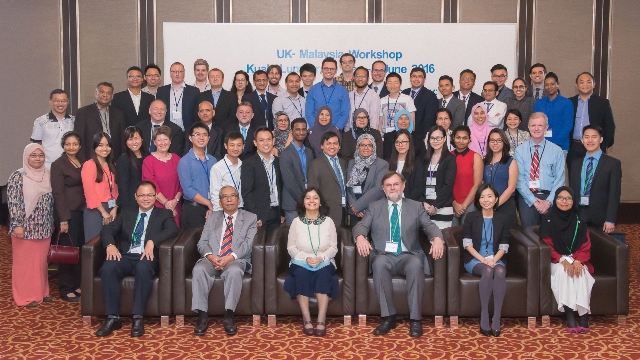On the 30th May CES and the Universiti Teknologi Malaysia co-organised a 5-day Researcher Links workshop to bring together researchers in the field of biorefining. Attendee Dr Katie Chong gives her perspective on the meeting:
 You may not believe me, but I have good news about climate change! How can this be possible I hear you say, we usually only hear stories of doom and gloom? Well the good news is that I know of at least 50 people in the UK and Malaysia putting all of their passion, heart and intelligence behind the quest for a more sustainable future. How do I know this? I know because I was lucky enough to meet them all at the UK-Malaysia workshop on Bioenergy, Biorefinery and the Bioeconomy that took place 30 May to 3 June 2016 in Kuala Lumpur (funded by the British Council Newton Fund).
You may not believe me, but I have good news about climate change! How can this be possible I hear you say, we usually only hear stories of doom and gloom? Well the good news is that I know of at least 50 people in the UK and Malaysia putting all of their passion, heart and intelligence behind the quest for a more sustainable future. How do I know this? I know because I was lucky enough to meet them all at the UK-Malaysia workshop on Bioenergy, Biorefinery and the Bioeconomy that took place 30 May to 3 June 2016 in Kuala Lumpur (funded by the British Council Newton Fund).
The workshop consisted of a mix of conference presentations, poster sessions, engagement sessions, industrial visits and the all-important social events. The topics covered in the workshop included technology, sustainability and policy, and industry from both the Malaysian and UK perspective. We learnt about the latest developments in technology for processing biomass into valuable products, how government policies can have a big impact on business development and what tools are available for us to analyse or optimise biorefinery processes. As well as presentations from scientists, there were sessions from organisations such as the Roundtable on Sustainable Palm Oil, BiotechCorp Malaysia, the United Nations Development Program (UNDP), the WWF and The Star Malaysia – one of the major streams of local newspaper.
For attendees from the UK it was interesting to learn about Malaysian biomass and wastes such as rubber seed oil, sago and the waste streams from palm oil plantations. Attendees heard about the work that is going on to convert these streams into unique products such as particle board or fuel. For the Malaysian attendees it was interesting for them to hear about the latest technology developments within the UK for converting biomass and waste into valuable products and the tools that have been developed to aid researchers and policymakers. The presentations and posters sparked lively discussions and interesting ideas between the attendees about how to move forward with biorefinery development.
The visits during the week included a trip to the Forest Research Institute of Malaysia (FRIM) and the Havys palm oil plantation. For scientists from the UK it was eye-opening to see (and smell!) the scale of palm oil operations in Malaysia. And to hear more about the unique challenges that are faced in making the process more efficient and sustainable. A visit to the Royal Selangor pewter factory involved us being put to work with hammers to make our own pewter bowls. Other highlights included us being mugged by monkeys at the Batu Caves and a cultural dance show where a number of us ended up on stage!
The Café Scientifique engagement event raised some important issues about climate change and the importance of public perception. Can we save our world from climate change? Would you be willing to fly on a plane fuelled by biofuel to help? Or give up your far-flung foreign holidays? The session began with a presentation about the efforts – and the challenges – for us to come to an international agreement on how to stop or at least slow down climate change. We heard about the history of the climate change agreements and how they can be implemented. The current Paris agreement sets out definitive targets to help us prevent the temperature increasing by 2°C when compared to pre-industrial levels. But are these reasonable? The session included a debate about the key importance of consumers moving forward and opened our eyes to more of the non-scientific challenges such as: are we ready as consumers to make the kind of sacrifices that would be required?
The aim of the workshop was to bring together early career researchers, stakeholders and experts in bioenergy and biorefineries to interact, learn from each other and explore opportunities for long-lasting research collaborations. This was achieved with great success and the organising committee should be commended on putting together this hugely successful workshop. We were all very sad when it ended but are excited to build on the relationships and ideas generated during this event.
The blog is recreated from Dr Chong’s original.
More information about the workshop can be found on the CES news website.
More memories from the event can be found here: http://www.theibest.org/apps/photos/album?albumid=15993149
